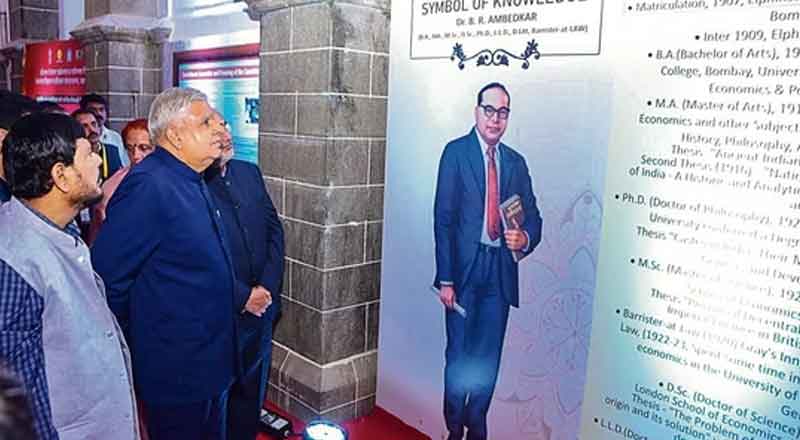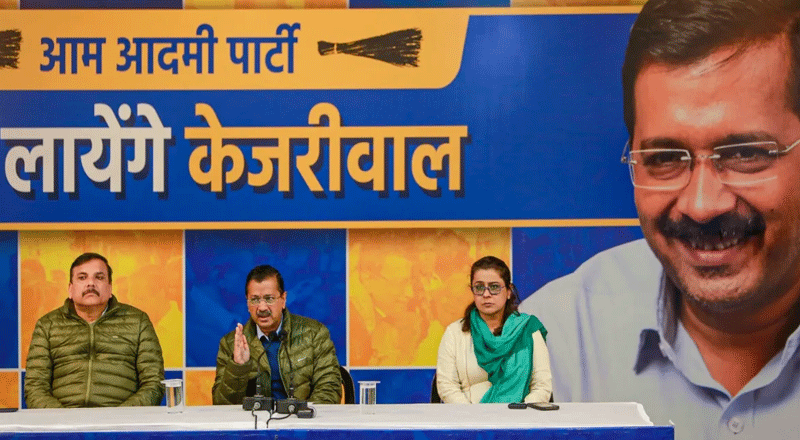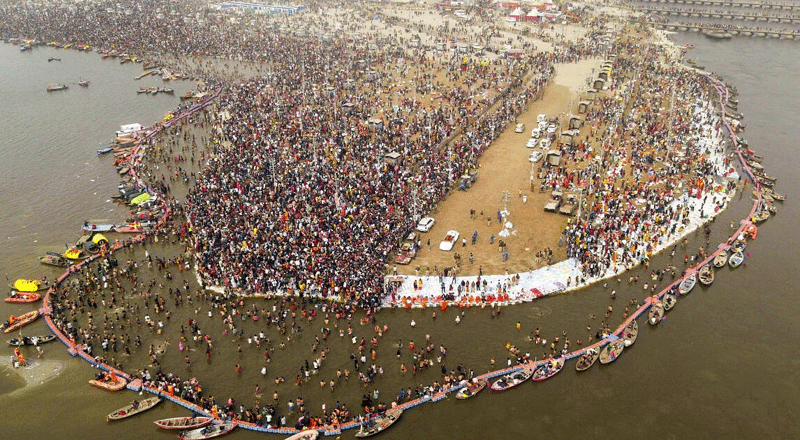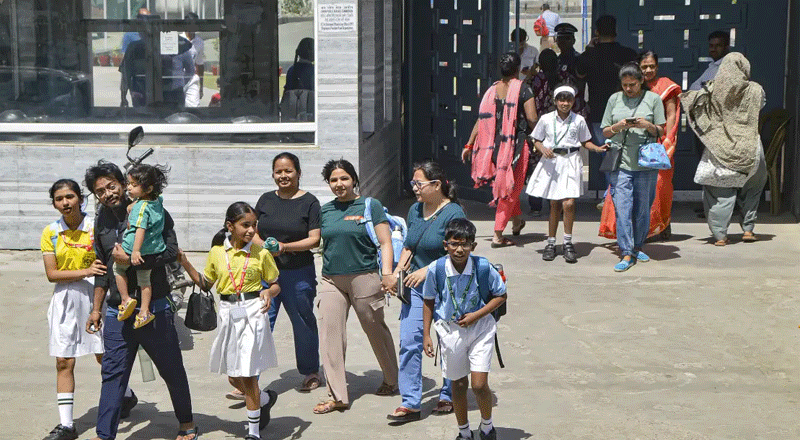The Vice-President, Shri Jagdeep Dhankhar today expressing deep concern said that the mentality that denied Bharat Ratna to Baba Saheb Ambedkar and was the cause for non-implementation of recommendations of Mandal Commission for nearly 10 years, that pattern of prejudice against reservation has been handed over and person holding constitutional position who is making serialised periodic ‘anti-India rant’ on foreign soil is talking about ending reservations.
Criticising the flaunting of Constitution by some, Shri Dhankhar said that, “Constitution is not to be flaunted like a book. Constitution has to be respected. Constitution has to be read. Constitution has to be understood. Merely presenting the constitution as a book, showcasing it—at least any civilised, knowledgeable person, someone with a devoted spirit towards the constitution, and one who reveres the essence of the constitution—will not accept it”.
Delivering his address as Chief Guest at the inauguration of Samvidhan Mandir at Elphinstone Technical High School & Jr. College in Mumbai today, Shri Dhankhar stated, “It is a matter of concern, a subject for reflection, and a topic for deep contemplation! The same mindset that was anti-reservation, the pattern of prejudice against reservation that has been handed over . Today, a person sitting in a constitutional position says abroad that reservations should be abolished”.
“Why the true gem, Bharat Ratna, was not awarded to Baba Saheb Ambedkar, it was awarded on March 31, 1990. Why was this honour not given earlier? Baba Saheb was very well-known as the architect of the Indian Constitution. Another significant issue related to Baba Saheb’s mindset is the Mandal Commission report. After this report was presented, for the next ten years, and during that decade when the country had two Prime Ministers—Smt. Indira Gandhi and Shri Rajiv Gandhi—not a single move was made regarding this report”, he added
Drawing attention to the anti reservation mindset, Shri Dhankhar reflected, “ Let me quote certain reflection about this mindset. Pandit Nehru, first PM of this country, What did he say?
“I do not like reservations in any form. Especially reservations in jobs”. According to him and sadly and unfortunately I quote “I am against any step that promotes inefficiency and takes us towards mediocracy.”
Comparing the statements- “Bangladesh can happen here” to like throwing an anarchist spanner, Shri Dhankhar exhorted the youth to rebuff the frontal attack on our democratic and constitutional values, the Vice-President underlined what Dr. B R Ambedkar said, he quoted , “India has once before lost her independence by the infidelity and treachery of some of her own people. Will history repeat itself? Will Indians place the country above their creed or will they place the creed above country? But this much is certain that if the parties place creed above country, our independence will be put in jeopardy a second time and probably be lost forever”.
This eventuality we must all resolutely guard against. We must be determined to defend our independence with the last drop of our blood, Shri Dhankhar added.
Asking the young generation to be mindful and aware of the 21 months of emergency, the darkest period in the history of post Independent India, he remarked, “Never forget a particular day; always remember it. It is a black day, a stain on our history. June 25, 1975, is the darkest chapter of our journey post-independence, the darkest period of our democracy. On that day, then Prime Minister Indira Gandhi unleashed a storm against the citizens and their rights. For 21 months, this country endured severe oppression. Thousands of people were imprisoned, and the rule of law was completely disregarded. What happened then defines dictatorship. The dream of Dr. Bhimrao Ambedkar was shattered within those 21 months. It was a vengeful dictatorship, and a saga of terror was unleashed. I want young boys, girls, and students to learn about that period and never forget it. This knowledge will give you the strength to protect the constitution. Keeping this in mind, in 2015, the Prime Minister of India announced that Constitution Day would be celebrated every year on November 26. We celebrate Constitution Day to remind ourselves how our Constitution was created, how it establishes our rights, how it empowers us, and how it creates a system where a person from an ordinary background can become Prime Minister, a farmer’s son can become Vice President, and a tribal woman of great calibre and elegance, who has seen all the shortcomings and ground realities, can become President”.
“June 25 is observed as Constitution Murder Day. It is very important to remember, especially if you have not witnessed that period, to have knowledge of history about what happened during those 21 months, how suddenly things changed, and how, solely to save her own position, everything was done beyond the limits. Ignoring the constitutional processes, crushing the spirit of the Constitution, and attacking its essence, the Emergency was declared in the dead of night. It was a chilling experience. That’s why I call it Samvidhan Hatya Diwas. It reminds us of the dictatorial mindset of then Prime Minister Indira Gandhi, who strangled the soul of democracy by imposing the Emergency. It is also a day to pay homage to every person who suffered due to the excesses of the Emergency—a dark phase unleashed by Congress in Indian history, the darkest phase ever”, he added.
Reflecting on the need for separation of power among different organs of the state and need for all the organs to work within their limitations thus avoid becoming trigger point of political inflammatory debate, Shri Dhankhar stated, “ All organs of the state—Judiciary, Legislature, and Executive—have a single purpose: to ensure the success of the fundamental spirit of the Constitution, to guarantee all rights to the common people, and to help India prosper and flourish.
They need to work in tandem and togetherness to nurture and blossom democratic values and further constitutional ideals. An Institution is well served when it is conscious of certain limitations. Some limitations are obvious, some limitations are very fine, they are subtle. Let these sacred platforms-Judiciary, legislature and executive not be trigger points of political inflammatory debate or narrative that is detrimental to the established institutions that serve the nation well in a challenging and daunting environment.
Our Institutions, all kinds of Institutions- Elections Commission, the investigative agencies they perform duty under tight situations, an observation can despirit them. It can set a political debate afloat. It can trigger a narrative. We have to be extremely conscious about our Institutions. They are robust, they are working independently, they are under checks and balances. They work under rule of law. In that situation, if we work in a manner to just generate some sensation, to become a focal point or epicenter of a political debate or a narrative that I will appeal to the concerned is wholly avoidable”.
Lamenting over the statements by some people in authority, The Vice-Presidnet stated, “Now look at where we have reached. One feels ashamed to even speak of it. One describes the horrifying and barbaric incident in Kolkata involving a lady doctor as a “symptomatic malaise.” What kind of description is that? Can we overlook or tolerate such sacrilege of our constitution? I call upon the youth to reject such actions. They are hurting our motherland, India”.
Shri C. P. Radhakrishnan, Governor Maharashtra, Shri Ramdas Aathawale, Minister of State, Social Justice & Empowerment, Government of India, Shri Magal Prabhat Lodha, Minister, Skill, Employment, Entrepreneurship & Innovation Department, Govt. of Maharashtra, Shri Ganesh Patil, Secretary, Skill, Employment, Entrepreneurship & Innovation Department, Govt. of Maharashtra and other dignitaries were also present on the occasion.





